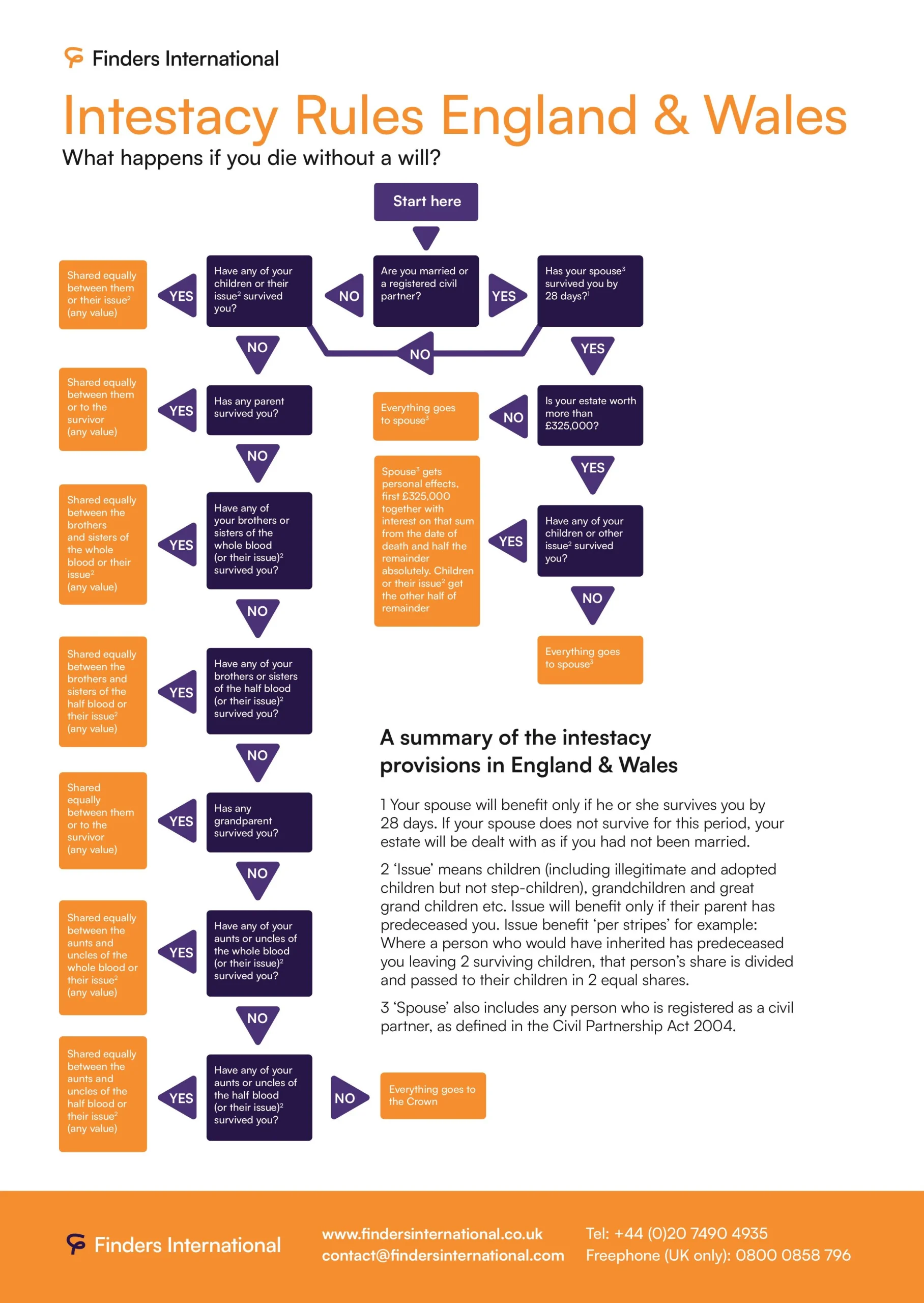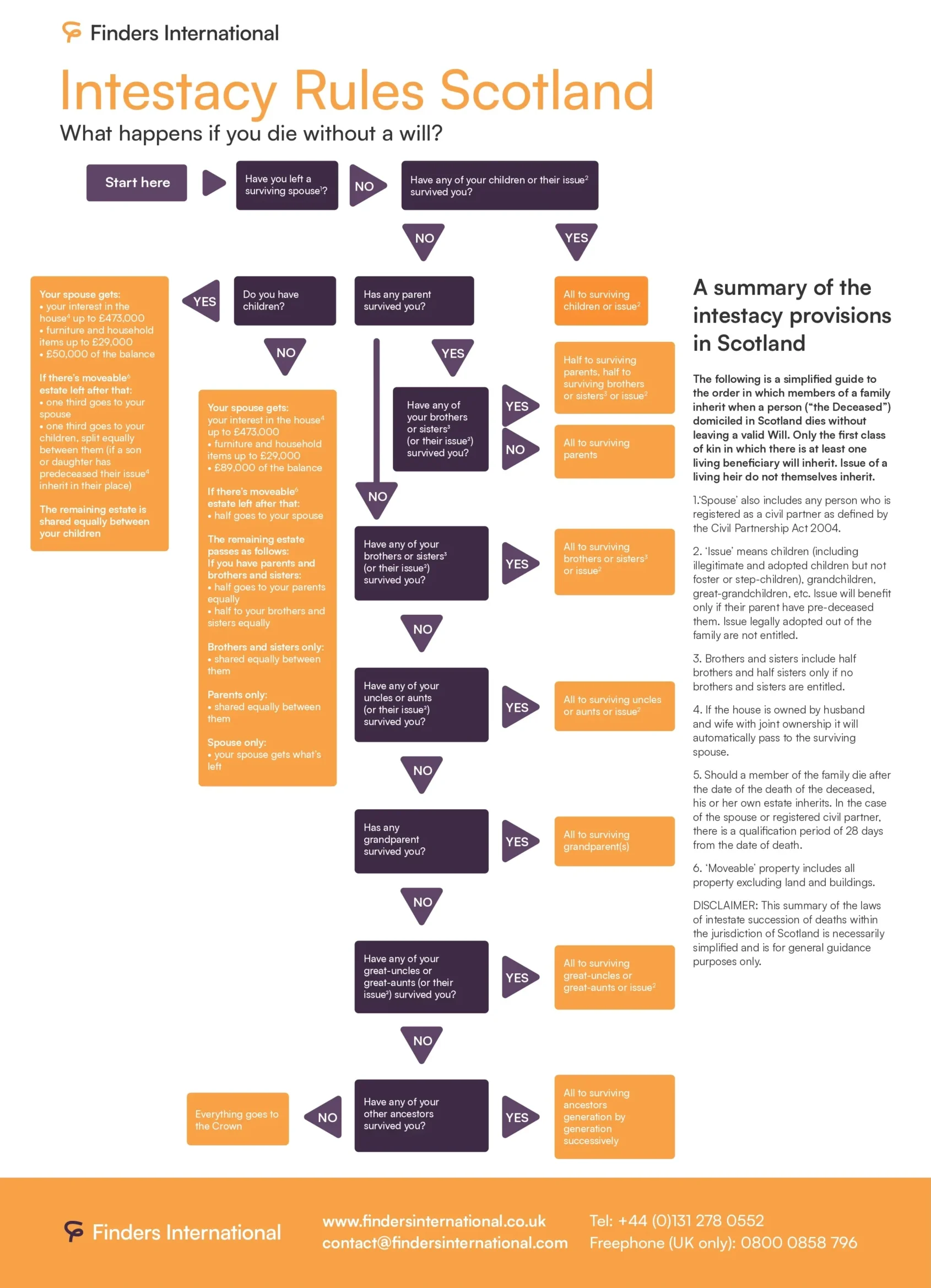
Intestacy Rules in England, Wales & Scotland
Who inherits if someone dies without a will?

Who inherits if someone dies without a will?
In England & Wales, when a person dies without a valid will, their estate is subject to the intestacy rules, which determine how their assets are distributed. Intestacy laws provide a framework for the fair and legal distribution of the deceased’s property and assets among their surviving relatives. This article aims to explore the English and Welsh intestacy rules of law, outlining the key principles, the order of priority of next of kin, and the implications of intestacy on the estate administration process.
Intestacy rules serve as a default mechanism for distributing a deceased person’s estate when no valid will exists. The rules are primarily governed by the Administration of Estates Act 1925, which has been amended over the years. These rules are designed to ensure a fair and logical distribution of assets based on familial relationships.

In short, a person who has died without having made a will.

Intestacy rules determine how an individual’s estate (property, assets, and belongings) will be distributed if they pass away without having a valid will in place. The rules differ between countries within the United Kingdom, such as England and Wales, and Scotland.
The Order of Priority according to the rules of intestacy
In the absence of a surviving spouse or civil partner, the intestacy rules move to the next level of kin. If there are children, they will be entitled to the entire estate. If these children have also died, their surviving descendants will take their shares.
If the deceased had no children but had surviving parents, the estate would be divided equally between the parents. If the parents have predeceased the deceased, the estate will pass to the deceased’s siblings or their children (or their children’s children and so on until surviving issue are found).
If there are no surviving siblings or issue thereof, the estate passes to half-blood siblings or issue thereof.
If there are no half-blood siblings, the intestate estate will be distributed among the deceased’s grandparents.
The intestacy rules determine the order of priority for the distribution of assets. The first consideration is whether the deceased left a surviving spouse or civil partner. If there is a surviving spouse or civil partner but no issue, the entire estate will usually pass to them. However, if there are children, the surviving spouse or civil partner will receive a statutory legacy (a fixed sum) and personal chattels, with the remaining estate divided equally between the spouse or civil partner and the children.
Naturally, by the time the deceased has died, their grandparents will often all be deceased, so intestacy rules move on to aunts and uncles of the whole blood or their surviving issue, and so on, following a set order of priority that reflects the closeness of familial relationships.
This includes cousins of the Deceased. However, intestate succession stops at the first surviving relative at each level and allows the descendants of relatives in the same class to inherit their share.
If there are no surviving uncles and aunts of the whole-blood or surviving descendants, intestate succession in England & Wales allows for one final category of next of kin to inherit – half-blood uncles and aunts or surviving descendants thereof.
When an individual dies without leaving a will in Scotland, the distribution of their estate is determined by the intestacy law in Scotland. The intestacy rules in Scotland are set out in the Succession (Scotland) Act 1964.
These rules prioritise certain relatives, known as “heirs,” based on their proximity of blood relationship to the deceased. Intestacy rules can be complex and can vary depending on the circumstances of the deceased person’s death.
The Order of Priority according to the rules of intestacy in Scotland
If the deceased is survived by a spouse or civil partner, they will inherit the whole estate, although children, parents and siblings may also inherit depending on the sums involved.
If no spouse or civil partner exists but the Deceased is survived by children (or their issue*), they will inherit the whole estate.
If the deceased has no spouse or children, the order of succession is as follows: Parents, siblings (or their issue*), aunts and uncles (or their issue*), great aunts and uncles and so on. Only the nearest class of kin with at least one living beneficiary will inherit.
* ’ issue’ means children, grandchildren, great-grandchildren, etc.
Intestacy rules can be complex, and there are additional rules that apply in certain circumstances. So, it is advisable to seek legal clarification if you are unsure about who will inherit a person’s estate.
Estates are advertised on the KLTR (King’s & Lord Treasurer’s Remembrancer) Ultimus Haeres [Ultimate Heir] list in the hope that an heir or heirs to the estate will come forward. If nobody comes forward within 10 years, then the estate is claimed by the Crown.

When someone dies intestate, the distribution of their estate can become complex and may not align with the Deceased’s wishes. Without a valid will, there is no provision for specific bequests, charitable donations, or the appointment of executors.
Moreover, the intestacy rules do not account for non-traditional family structures, step-children, unmarried partners, or close friends who may have been financially dependent on the deceased. Without a will, these individuals may receive nothing from the estate.
DNA evidence and Court challenges can succeed in obtaining financial settlements for people whose relationships to the deceased were not documented in the traditional fashion.
Understanding the English & Welsh Intestacy and Scottish Intestacy rules is essential for anyone concerned about the distribution of their assets after death without leaving a valid will.
Intestacy can lead to unintended consequences, delays, and disputes, especially in cases where complex family structures or dependents are involved, but sometimes human nature (and sometimes superstition) defies logic and “intestate” remains the default legal status for most people.
NB: It’s important to note that intestacy rules are subject to change due to legal updates and amendments. To ensure accurate information, it’s recommended to consult legal professionals or authoritative sources specific to the current year.
Looks like you’re on the UK site, choose another location to see content for you.